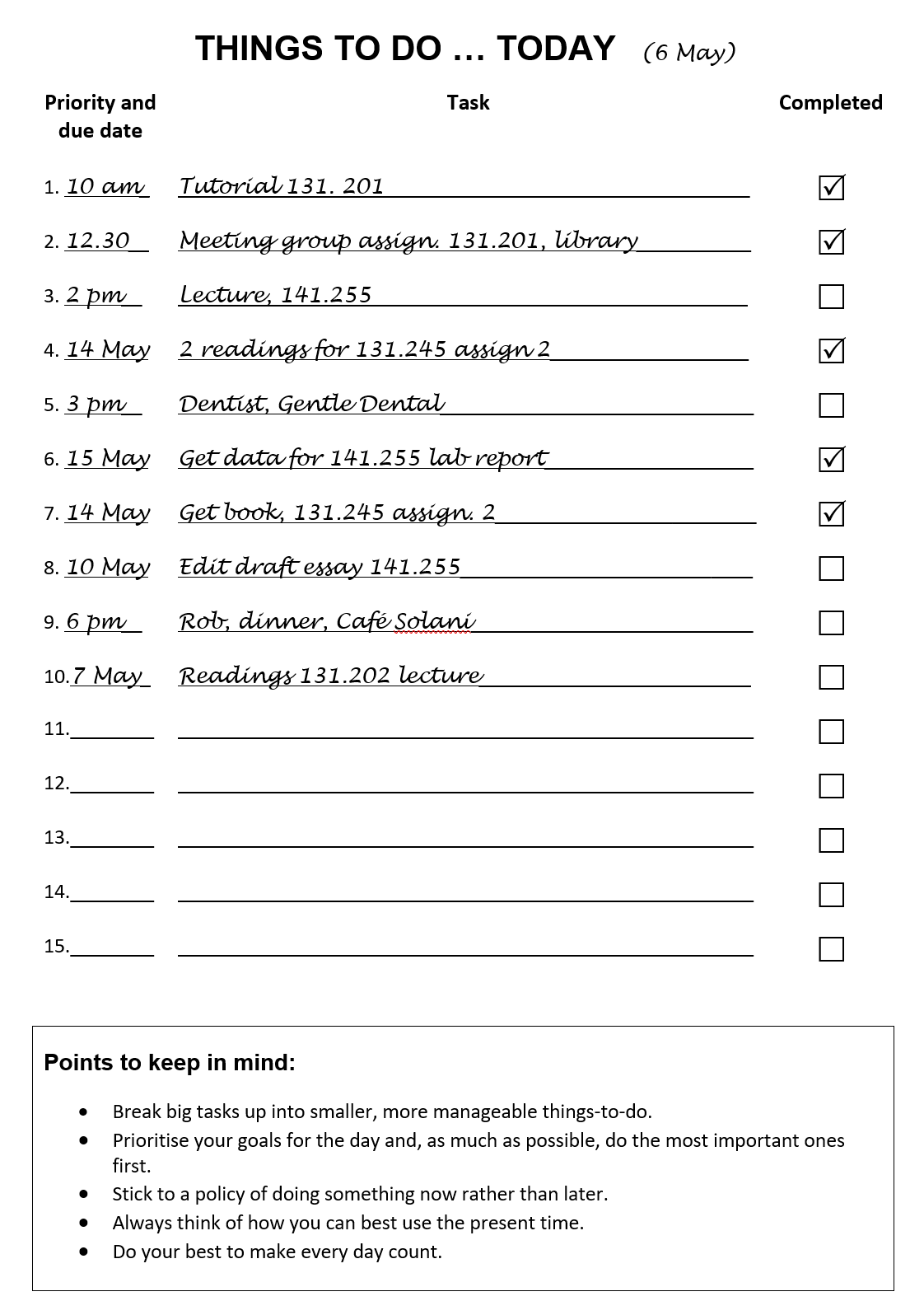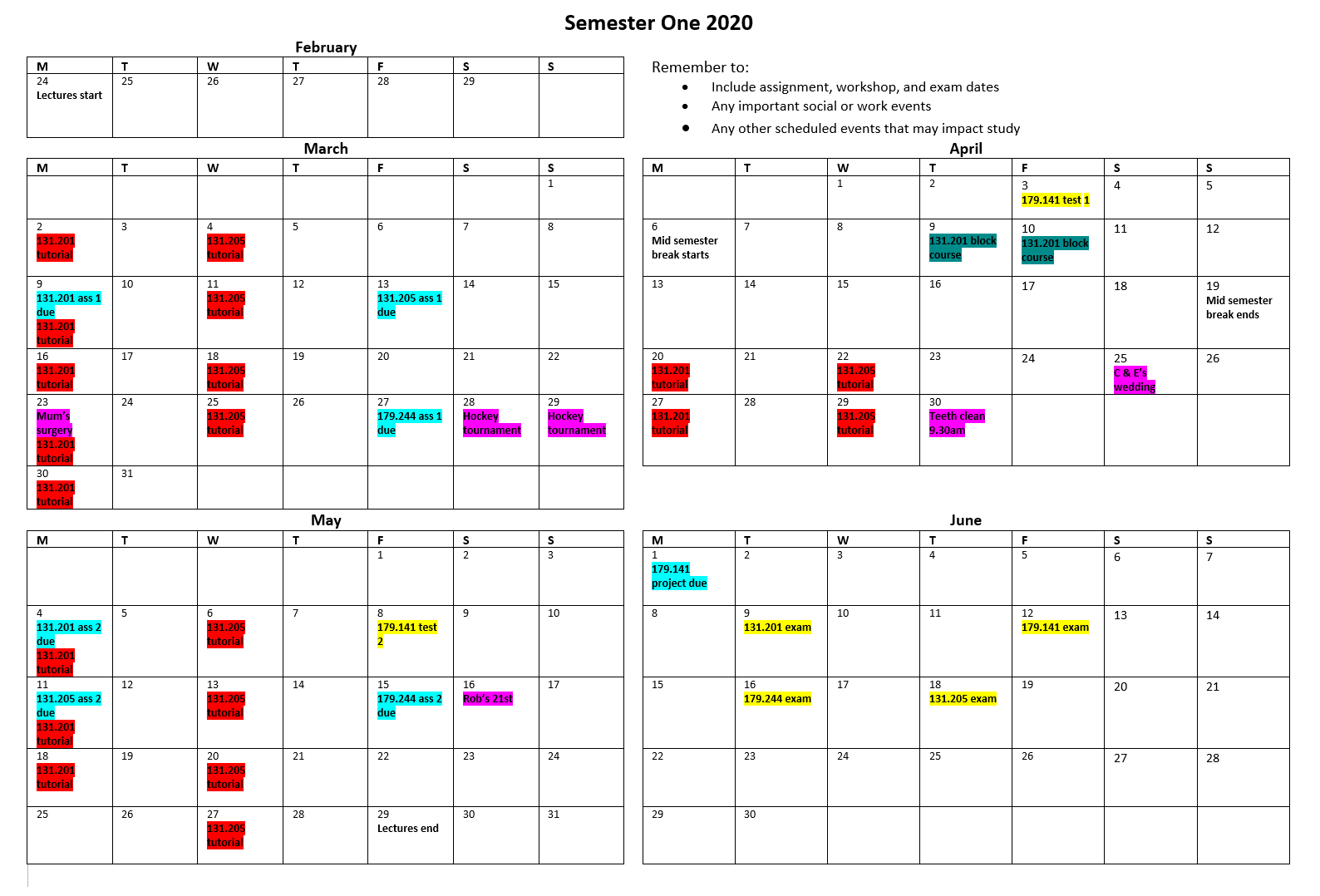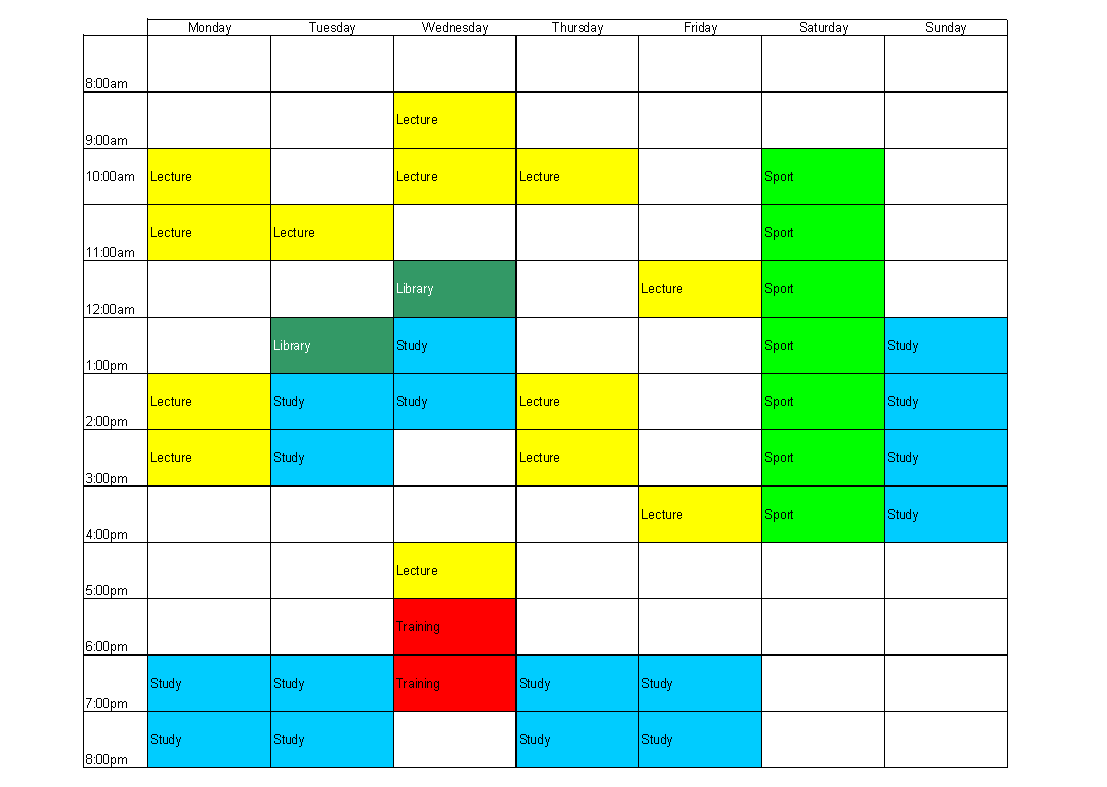Time management for internal students
Time management is important to internal students because the work associated with the full time study load of four papers can be very demanding and time consuming.
It is very easy to get behind and then it is difficult to catch up as the lectures, readings, and tutorials continually provide more information, whilst you are still dealing with information from earlier in semester.
There are also other activities which you will want to do and which you should be able to do too.
The important thing is getting the balance between academic work and other activities such as sports, clubs and socialising just right. (Use the planner given out by the banks and MUSA at the beginning of semester to show you what you have committed yourself to for the semester.)
Two strategies which work well to sort out your day to day activities (everyone is different) are weekly planners and things to do today lists.
Semester timetable
This timetable is very important as it gives you and others an overview what you are doing during the semester. Some points to remember while completing a semester timetable:
It is important to complete this as soon as possible as it will give you an indication of your workload.
By entering assignment due dates for all papers you will be able to see possible high pressure times, such as several assignments due in the same week. This is very common but can be planned for and coped with. A lecturer is not going to be sympathetic about two assignments due on the same day as many others have the same problem. Part of being a successful independent learner is personal timetabling of the semester schedule.
- Personal and family events should be included so that you can plan for any potential clash early on.
- Support from those you live with is vital, and your friends/flatmates deserve to know when you are going to be around, and are more likely to be supportive if they know when your assignments are due.
- Doing study is not meant to exclude you from family events such as weddings. You can do both.
- Tell your employer you are studying - most are very supportive. They may give you a day's study leave before your exam. They may refund your fees if you pass.
- Make sure you do not omit work deadlines in your weekly or daily schedule.
Three weeks preparation is ideal for assignments.
However, think ahead by choosing the topic early and getting books from the library. This is vital in a tight time schedule. Everyone else in your class is probably looking for the same books! If you are lucky enough to get the book first, use it. You may well be hit with a recall notice in a few days' time because other students have requested it. Use a photocopier for the best bits. You can also request the book again after you have returned it.
- This allows you to see how close together your exams are and plan accordingly.
- Knowing these and keeping them in mind gives you time for exam preparation.
- It also reminds you to inform your employer early on that you may want leave for study and/or to sit the exam.
- All good schedules have gaps as well as time set aside for your leisure and personal life.
- These gaps - called flexi-time - are there so that there is time for the unexpected or for the tasks that take too long.
- You will get stressed if you do not allow time for personal matters as well as work.
It is important that you share this information with other people / friends / family as they may be able support you when needed and provide some extra motivation.
- Microsoft Word version
 (112KB)
(112KB)
Weekly planners
To start the plan, you need a master timetable with all your regular commitments entered on it. This includes all your lectures, tutorials, labs, meal times, cooking duties, gym sessions, part-time work, sports practice, church times, plus time to spend with friends and family.
Once this is filled in, you have a good idea of how much time is left for study, reading textbooks, and writing assignments. If there is very little time left, then you may have to consider reducing some of your (non-academic) commitments during the semester.
Reflect on what you have to accomplish for the week and enter goals according to the amount of time you think you will need.
- The shorter gaps between lectures can be for eating, reading, using the computer labs, or getting books from the library for the next assignment.
- Longer gaps or evenings can be used for reading, going over notes, studying, taking notes from references, writing assignments, lab write-ups or doing maths / physics / chemistry / accounting calculations.
- Estimate how long something will take by applying the sanity zone formula. If you think a writing task will take an hour, allow an hour and a half (that is, half as long again).
- Leave some gaps for flexi-time: time that you can use for study if something unexpected happens or for rest if you are up-to-date.
- Do not fill your weekly planner. Make sure it includes rest and recreation time.
- Microsoft Word version
 (46KB)
(46KB) - PDF version
 (7KB)
(7KB)
“Things to do today” lists
Many students prefer a daily plan and so a daily “things to do today” list is a good strategy for these people.
The To Do list requires you to reflect on your progress each day and think about the next steps. It keeps you focused and motivated.
- At the end of each day work out what you have to do the next day.
- Write the list.
- Use SMART goals.
- Prioritise those that must be done above those you would like to get done and from those that can wait indefinitely.
- This list will not be entirely academic tasks: a goal such as “take the cat to the vet” might be a high priority task for a particular day.
- Work through the list starting with the most urgent.
- Cross tasks off as they are accomplished.
- Microsoft Word version
 (42KB)
(42KB) - PDF version
 (17KB)
(17KB)



